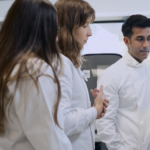What is a Clinical Research Training Fellowship?
Clinical research is critical to accelerating discoveries from the laboratory into clinical practice. That’s why we are committed to training the next generation of clinical researchers so they are equipped with the skills and expertise to enable them to succeed.
Our Clinical Research Training Fellowships (CRTFs) allow clinicians to undertake a period of full-time PhD training in a cancer-relevant field.
Our fellowships typically last for three years, but can last for up to four years, and it is expected that you will return to a training programme in the UK after completing your research degree.
Why do a Clinical Research Training Fellowship?
- Graduate with a PhD in a cancer-relevant field
- Gain the skills, knowledge and training to become a future clinical researcher
- Have your PhD tuition fees paid, along with an appropriate salary in line with your current salary
- Receive mentorship and training from world-leading academic clinicians and cancer scientists
Leeds-Manchester Clinical Research Training Fellowships
As part of our Cancer Research UK Clinical Academic Training Award, we have entered into a strategic partnership with the University of Leeds to fund Leeds-Manchester Clinical Research Training Fellowships (CRTFs) in academic pathology and clinical trials. CRTFs benefit from research expertise and infrastructure across these institutions and will spend substantial time at both universities. Appointees register for their PhD at the home institution of their lead supervisor. Read about Dr Jim Zhong, a recent graduate of this scheme.
Leeds-Manchester CRTFs are advertised annually in line with our other PhD programmes.
Key information
Find out more about our Clinical Research Training Fellowships.
Our Clinical Research Training Fellowship opportunities for 2024 entry have now closed.
To be considered for our CRTF projects, you must submit a formal online application form.
Full details on how to apply can be found on the CRUK Manchester Centre PhD Training Scheme (MCRC) website.
We encourage all candidates to make contact with supervisors who they are interested in working with on postgraduate research programmes.
Our Clinical Research Training Fellowships are usually funded for three years but in certain circumstances may be funded for four years.
The fellowship covers:
- PhD project running costs
- University tuition fees (at the UK rate, with some scholarships available for high-performing EU/International candidates)
- An appropriate salary in line with your current salary
Funding and eligibility vary depending on the programme available and we encourage you to check with the relevant scheme ahead of applying.
International Candidates
The University of Manchester aims to support the most outstanding applicants from outside the UK.
We are able to offer a limited number of bursaries to high-performing EU and international candidates, covering PhD fees only. Bursaries do not include financial support for visa/health surcharges.
We assessed each EU and international candidate’s suitability for a bursary at the application and interview stages.
You must be a post-registration clinician, and ideally have a specialist post in a related subject, to apply for our Clinical Research Training Fellowships.
You should also hold, or be about to obtain, a minimum upper second class (or equivalent) undergraduate degree in a relevant subject. A related master’s degree would be an advantage.
It is generally expected that CRTFs will return to a training programme in the UK upon completion of their research degree.
International applicants (including EU nationals) must ensure they meet the academic eligibility criteria (including English Language) before contacting potential supervisors to express an interest in their project. Eligibility information can be found on the University’s Country Specific information page.
Navigation
Non-Clinical PhD Studentships
Learn more about our Non-Clinical PhD Studentships and other opportunities.
Nursing and Allied Health Professional Academic Pathways
This pathway allows nursing and allied health professionals (AHPs) to develop academic careers alongside their current clinical and managerial responsibilities.
MB-PhDs
Our MB-PhD studentship allows aspiring clinical scientists and academics to undertake medical degree training in tandem with the research expertise of a PhD in Cancer Sciences.
RadNet Manchester AHP Doctoral Academy
RadNet Manchester is the only unit in CRUK’s radiation research network with a dedicated Doctoral Training Academy focused on the development of Allied Health Professionals working in radiotherapy research.
ACED PhD Studentships
Our ACED PhD Studentships will set you up as a future leader of cancer early detection.
Why Manchester?
See why our students choose to study in Manchester.






